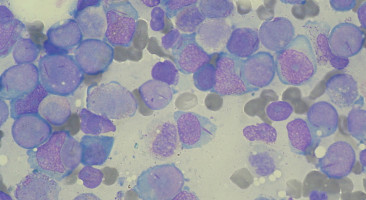
Astellas Pharma Europe have announced that preliminary data from a Phase I/II trial on the safety, tolerability and efficacy of ASP2215, a selective inhibitor of FLT3/AXL, in patients with relapsed or refractory (R/R) acute myeloid leukaemia (AML) were presented at the 20th Congress of the European Hematology Association in Vienna, Austria.
Preliminary data from the Phase I/II trial demonstrated a 57.5 percent overall response rate and a 47.2 percent composite complete remission (CR) rate (CR CR with incomplete platelet recovery CR with incomplete haematologic recovery) in 106 patients with FLT3 mutations who received 80 mg and higher doses.1
A plasma inhibitory activity assay also confirmed sustained FLT3 inhibition consistently in patients receiving doses of 80 mg and above.1
These data were first presented at the American Society of Clinical Oncology’s (ASCO) annual meeting in Chicago on 30 May 2015.
Additional preliminary data from the Phase I/II trial presented at ASCO and EHA also showed that the median duration of response was 18 weeks across all doses and median overall survival was approximately 27 weeks at 80 mg and above in FLT3 mutation positive patients.1
At EHA, preferable pharmacokinetics (PK) profile was also presented.
“ASP2215 is an exciting therapeutic development for relapsed and refractory acute myeloid leukaemia patients with FLT3 mutations, where there is a significant unmet need,” said Alexander Perl M.D., Assistant Professor in the Division of Hematology/Oncology, Perelman School of Medicine, University of Pennsylvania, Philadelphia, USA.
“Treatment with ASP2215 has demonstrated a high overall response rate and promising survival in this group of patients who have highly aggressive leukaemia and historically fared poorly with standard chemotherapy. ASP2215 is quite well tolerated in this setting and provides patients a low toxicity, effective option either to bridge to transplant with curative intent or to maintain quality of life for extended periods.”
ASP2215 is a receptor tyrosine kinase inhibitor of FLT3 and AXL involved in the growth of cancer cells.1
ASP2215 has demonstrated inhibitory activity against FLT3 internal tandem duplication (ITD) as well as tyrosine kinase domain (TKD), two common types of FLT3 mutations1 that are seen in up to one third of patients with AML.1, 2
Both of these mutations are typically associated with a poor prognosis.3
The ASP2215 Phase 1/2 trial design followed a 3 3 escalation and evaluated doses from 20 to 450 mg once daily.1
A parallel multi-dose expansion cohort was initiated based on the efficacy seen in dose escalation.
A total of 198 patients were enrolled in the study, 24 in the dose escalation and 174 in the dose expansion cohorts.1
At the 450 mg dose, two patients reached dose limiting toxicity (grade 3 diarrhoea and ALT/AST elevation), and the maximum tolerated dose was determined to be 300 mg.1
A randomised Phase III trial of ASP2215 at 120 mg per day in relapsed and refractory AML patients is planned.
For more information, visit https://clinicaltrials.gov/ct2/show/NCT02421939.
References
1. Perl A, Altman J, Cortes J, et al. Results of a first in-human, Phase 1/2 trial of ASP2215, a selective, potent oral inhibitor of FLT3/AXL, in patients with relapsed or refractory acute myeloid leukaemia. 20th Congress of the European Hematology Association, Vienna, Austria. Presentation [Abstract No. S798]
2. Levis, M. FLT3 mutations in acute myeloid leukemia: what is the best approach in 2013? ASH Education Book, December 6, 2013 vol. 2013 no. 1 220-226. Available at: http://asheducationbook.hematologylibrary.org/content/2013/1/220.long (Last accessed June 2015)
3. Grunwald MR, Levis MJ. FLT3 inhibitors for acute myeloid leukemia: a review of their efficacy and mechanisms of resistance. Int J Hematol 2013; 97(6):683-94
4. Cancer Research UK. The blood and acute myeloid leukaemia. Available at: http://www.cancerresearchuk.org/about-cancer/type/aml/about/the-blood-and-acute-myeloid-leukaemia (Last accessed June 2015)
5. Patient UK. Acute Myeloid Leukaemia factsheet. Available at http://www.patient.co.uk/doctor/acute-myeloid-leukaemia-pro (Last accessed June 2015)
6. American Cancer Society. Treatment response rates for acute myeloid leukemia. Available at: http://www.cancer.org/cancer/leukemia-acutemyeloidaml/detailedguide/leukemia--acute-myeloid--myelogenous--treating-response-rates. (Last accessed June 2015)